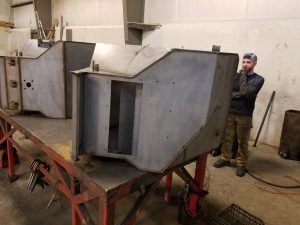What is Metal Fabrication?

WHAT IS METAL FABRICATION? Find out Here
Metal fabrication is the creation of metal structures by cutting, bending and assembling processes. It is a value-added process involving the creation of machines, parts, and structures from various raw materials.
Many procedures are often required to execute side by side in a collection of vendors. Typically, a fabrication shop bids on a job, usually based on engineering drawings, and if awarded the contract, builds the product. Large fab shops employ a multitude of value-added processes, including welding, cutting, forming and machining. As with other manufacturing processes, both human labor and automation are commonly used. A fabricated product may be called a fabrication, and shops specializing in this type of work are called fab shops. The end products of other common types of metalworking, such as machining, metal stamping, forging, and casting, may be similar in shape and function, but those processes are not classified as fabrication.
DIFFERENCE BETWEEN FABRICATION And MANUFACTURING?
Before we talk about metal fabrication, it’s essential to understand the difference between manufacturing and fabrication since both processes are often confused.
Fabrication:
Fabrication is an industrial term that refers to the manipulation of raw materials (such as steel) for the making of machines and structures. Fabrication is generally about building something based upon some plan/idea or other workable approach.
Manufacturing:
Manufacturing refers to making end products for use or sale from raw materials, either by hand or with the help of machines. Large scale production is involved in the manufacturing sector with the use of tools, machines, and biological/chemical processing.
HISTORY OF METAL FABRICATION
Humans have been mining and machining metal for the past 10 millennia, as evidenced by a copper pendant archaeologists found in northern Iraq that dates back to about 9,000 BCE. Fabrication shops as we know them today began to exist around the Industrial Revolution, when sheet metal was in much higher demand than before. The invention of the hydraulic press, which allowed manufacturers to apply unprecedented pressures to pieces of metal, transformed the metal fabrication industry.
TYPES OF FABRICATION:
The fabrication method depends on part geometry, materials, the product’s purpose, and any given project. There are many types of fabrication, but here are some common types of metal fabrication:
Cutting
This is the most fundamental process in metal fabrication, and it can be accomplished through waterjet and laser cutting, chopping, sawing, shearing and chiseling. Cutting is what turns the sheet metal into a piece of the required size and shape. Today, waterjet and laser cutting comprise the foremost technologies available.
Welding
Welding is an economical and efficient way to join metals. Welding is a fabrication process in which two or more parts are fused together with the application of heat.
Casting
Casting is the process by which melted metal is poured into a die to cool and harden over time to make a required product. This is helpful when you need multiple identical parts–such as nozzles, nuts and bolts, or mounting plates.
METAL FABRICATION Process?
Though it’s true that most metal fabrication focuses on the cutting and shaping of metal, there are several steps typically involved in a successful fabricated project. The fabrication process starts with design and ends with a finished and functional part mentioned below.
Designing the Project
Fabricating the Part
Assembling and Finishing the Project
FUTURE OF FABRICATION?
The industry is learning to balance capacity with variability and find new ways to build support for the inherent variability of customer demands that are driven by an ever-changing economy. As machinery becomes more sophisticated, the ability to maintain a constant level of capital and profit is improving. while forecasting can be difficult in a company based on the economic fortune of its clients. For all your metal fabrication needs you can contact Carlson Manufacturing Inc.
We recommend Great Manufacturing, LLC.
